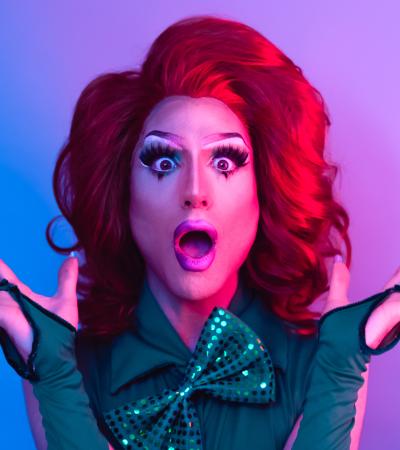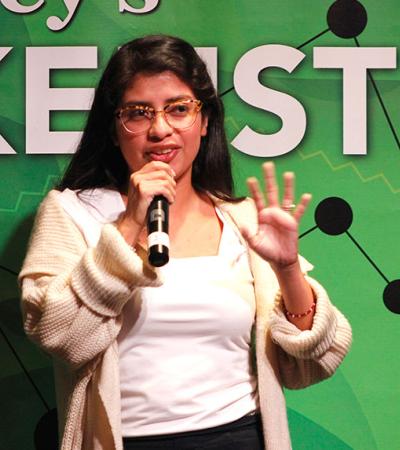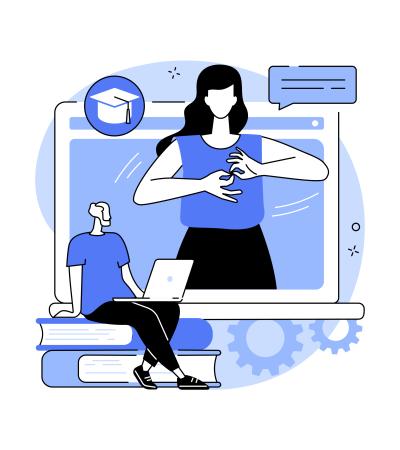In May, ALA awarded its first Libraries Transform Communities Engagement Grant to the Milwaukee Public Library for Deaf Storyslam, a free community event, created in 2019, in which Deaf individuals of varying backgrounds share personal stories and experiences with the broader community. At the evening event, six Deaf people shared prepared stories under the theme "Labels" in front of a diverse audience of Deaf and hearing community members.
For the second Deaf Storyslam, the library seeks to increase the number of Deaf community members in the planning process, train additional Deaf community members as storytelling coaches, increase attendance and continue to offer the trilingual (American Sign Language, English, Spanish) format.
>>> Read about the 2020 Deaf Storyslam, offered virtually due to COVID-19. <<<
Kristina Gomez, Milwaukee Public Library's events and programming librarian, tells us about Deaf Storyslam, its contributions to the Deaf community and the library's role in bringing the program to the public.
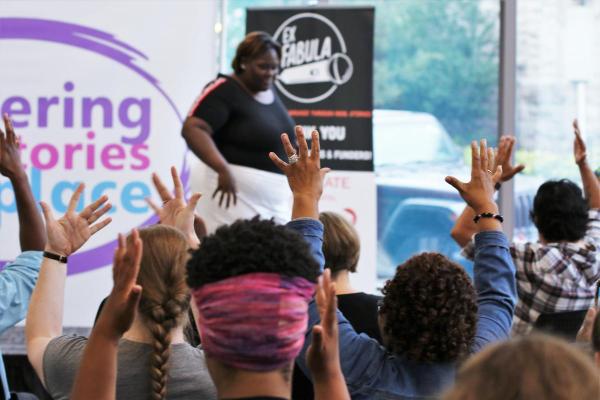
How is community engagement defined at the Milwaukee Public Library?
In the broadest sense, community engagement is actively collaborating with community members to advance their goals. It is a community-centered framework grounded in the understanding that community members have a right to be informed, consulted and involved in processes and activities connected to the health and betterment and their community.
How did the collaboration between the library and the Deaf community first come about?
Three years ago Milwaukee Public Library was awarded a National Endowment for the Arts (NEA) Our Town grant for a project called Gathering Art, Stories, and Place. A goal of the project was to empower neighbors to share and celebrate their experiences through storytelling and art.
In collaboration with a local storytelling nonprofit, Ex Fabula, Milwaukee Public Library invited Deaf community members to co-lead the storytelling component of the project. Their enthusiasm for the project goals led to its success.
It is important to be intentional about inclusion in community engagement work from the beginning. How do you define the “community” in “community engagement?” Who is invited to the table and who is excluded (intentionally or unintentionally)? Our Deaf neighbors shared they are often left out of community conversations. They are often overlooked as artists and leaders. They felt the Deaf Storyslam offered a unique opportunity to center Deaf experiences and stories and deepen connections between the Deaf and hearing communities.
Why do you think the first Deaf Storyslam had such a broad and diverse audience? How do you hope to maintain that for the second Storyslam?
I’ll echo my earlier statement on being intentional about inclusion from the start of a project, program or service. At one of our first planning meetings two of our Latinx Deaf community advisers shared that even when Deaf individuals and experiences are recognized and celebrated, it is often a white Deaf person being centered. When was the last time you saw a Deaf character represented on a television show? Was it a Deaf person of color?
The planning team felt it was important to address the lack of Deaf POC representation within the Deaf Storyslam through both the storytellers and the audience. We focused storyteller recruiting efforts on Deaf POC and were successful in partnering with six community members of diverse races, ethnicities and ages. We tailored marketing efforts to reach a diverse audience, including Spanish language print and television appearances and a wide range of social media promotion.
We felt it was important to offer Spanish, in addition to English, translation of American Sign Language, making the Storyslam a trilingual event. The space we created for stories to be shared and encountered was incredibly special and serves as the foundation for the next phase of the Deaf Storyslam project.
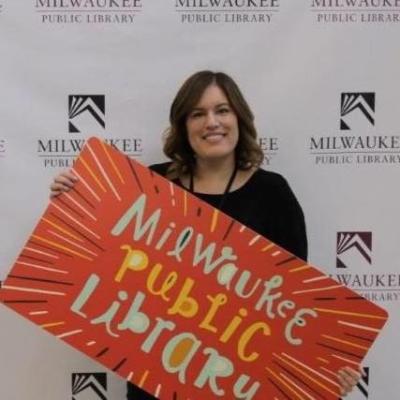
How did your collaboration with nonprofits help widen the program’s reach?
This project would not have been possible without our nonprofit partner, Ex Fabula. Community partnerships are the basis for all successful library programs and services, and the Deaf Storyslam is a prime example.
Ex Fabula specializes in storytelling, offering coach training and storytelling workshops for the public. As with any art form, there’s a skills-building component to storytelling. Ex Fabula brings over a decade of expertise in developing the craft of storytelling and in connecting community through true personal stories. The project built upon the extensive network both the Milwaukee Public Library and Ex Fabula have and reinforced our shared goals of community building.
How has the program enabled the library to reach new segments of the Milwaukee community?
The project has, above all, strengthened the relationship between Milwaukee Public Library and Milwaukee’s Deaf community.
The library had an existing process for community members to request reasonable accommodations such as American Sign Language (ASL) interpretation. While this is an important (and legally required) service, there was not a history of collaborative engagement with Deaf community in library programming. This multi-year project was a shift in both focus and process. The experience also highlighted the work that still needs to be done in order to serve our Deaf community members at the same level we serve our hearing community members. The event also attracted one of our most diverse audiences.
Seventy-four percent of people involved in this project were 18 to 34 years old, and 45 percent were male. Three percent were American Indian or Alaskan Native, 26 percent were Black, 21 percent were Latinx, 42 percent were white, and 8 percent were other. The project clearly had broad appeal, and I’m excited to build upon this momentum!
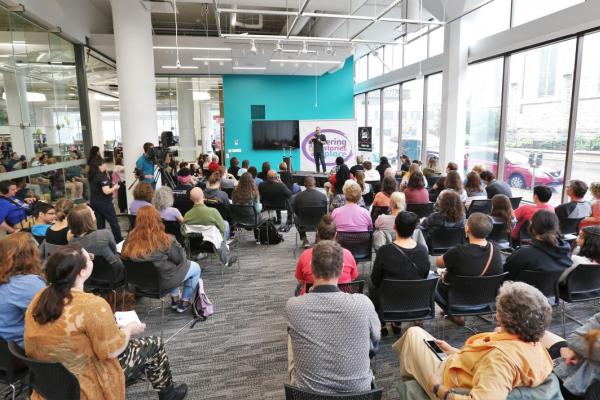
What does the future of this program look like to you? How do you hope to serve as an example for other institutions who want to start connecting with the Deaf community?
We had a project planning meeting last night via Zoom with our Deaf community members, and the conversation turned to what we want to call this project moving forward. We’re still working on that question, but one of our Deaf community members, Jonathon, showed us a sign that has a few different translations but focus on being committed to the journey or process of collaboration and togetherness.
This is what the future of the program looks and feels like to me: a continuous re-commitment to collaboration with our Deaf community and providing a platform for their stories. I hope other institutions look to this project as a model for community engagement and community building.
What types of opportunities do you see for community conversations that involve Deaf and hearing community members?
Personal stories reveal shared humanity while also acknowledging that each person’s journey is unique. Last year’s Storyslam theme was “labels/identity,” and the stories reframed hearing individuals’ understanding of the way labels impact the lives and identity of Deaf community members. Perhaps our hearing audience recalled a time when they were labeled. How did that experience impact them? How were their experiences different from the storytellers? How were they similar?
“It is easy to take certain privileges for granted such as easily being understood in an interview,” commented one non-deaf attendee, referring to a story where a Deaf individual interviewed for a job by passing paper back and forth to the interviewer, because the company didn’t want to spend money on an interpreter.
“As a hearing ASL student, it was a great experience to hear about Deaf culture from live performances,” noted another.
We are currently developing the theme for this year’s Storyslam, and ideas range from employment experiences, police encounters and being Deaf in our new COVID world. We know any of these personal stories have endless potential for dialogue between hearing and Deaf community members. We are excited for where this conversation leads.
The Libraries Transform Communities Engagement Grant was made possible by former ALA president and longtime generous supporter Nancy Kranich, with additional contributions raised by solicitations and a matching opportunity in 2017. Learn more at ala.org/LTCEG.

